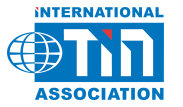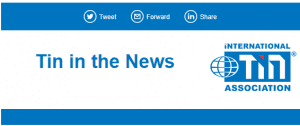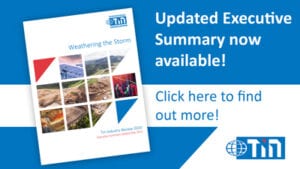
Tin explorer Elementos has agreed to acquire up to 50% of Iberian Smelting, which owns and operates the Robledallano smelter in Spain, for €3.2m over a five-year period.
Currently, the major shareholder of Iberian Smelting is predominantly secondary refined tin and solder producer CRM Synergies, holding a 90% stake. Robledallano is 220 km from Elementos’ Oropesa project, set for first tin concentrate production by the end of 2027.
Elementos Managing Director Joe David commented: “The completion of this transaction will be significant and will drive several key economic, strategic and political benefits to the company. Establishing a vertical integrated (mine-to-metal) supply-chain within Europe, which will propel Elementos down the value chain from a tin concentrate miner to a tin metal producer.”
CRM Synergies Majority Owner and Director Manuel Alonso Lopez commented: “The synergies between our two Spanish tin operations are significant, and it is clear to CRM that the plan to together own the Iberian Smelting company with Elementos and operate the Robledallano Tin Smelter at highly efficient levels is mutually beneficial.”
Robledallano was previously operated as a lead smelter and a lead-acid battery recycling plant, and was acquired by CRM in 2021, who commissioned a new rotary furnace for tin processing in 2022. Currently, Iberian Smelting are using predominantly secondary feedstocks, mostly intermediate tin products, and recycled process residues.
The smelter holds all required permits and is licensed to smelt base metal concentrates and residue products up to 20 thousand tonnes per annum, and has an estimated tin feedstock capacity of 10-12 ktpa. Elementos highlighted the expansion potential, with the company committing to capital investment to install a vacuum furnace for further refining after rotary smelting.
Our view: Elementos’ interest in Iberian Smelting, on completion will make the company Europe’s only primary refined tin producer. Tin premiums on LME prices in Europe are typically US$200-500 per tonne higher than in Asia, indicating an opportunity for increased refined production in Europe.
Vertical integration on a national scale is increasingly being targeted in the tin industry, with existing ore and concentrate export bans in Indonesia and Uganda, and ‘first refusal’ agreements for smelters in Bolivia. On a company scale, there is growing interest from miners to construct smelters, particularly in Europe, Africa, and Australia where there is little primary refined tin production.


